|
Paul boldly reminds Christians, “our citizenship is in heaven” (Phil 3:20). In a sense, our single most political act on this earth is not who we vote for in the next election, but our Baptism. In baptism, we discover our truest identity as adopted sons and daughters of God, and together become “one in Christ Jesus” (Galatians 3:27-28). But as citizens of heaven, we also live as “aliens and sojourners” (1 Peter 2:11). This Jubilee Year of Mercy issues an invitation and challenge for Catholics to transform what society regards as ‘political problems with political solutions’ into encounters with God’s grace and mercy. Borrowing a phrase from Biblical scholar Walter Brueggemann, Christians are not simply called to meet issues with more political machination, but greater “prophetic imagination.” When Christians do not actively imagine and enact truthful and merciful alternatives to social evils, pragmatism and deceit can lay deep roots in our society. In the Book of Leviticus, an important aspect of the ancient Jubilee Year involves extending mercy to a group of people the Bible calls resident aliens, outsiders living among the Israelites who belonged to no tribe. They occupied a vulnerable position in society and were not always welcomed, but God’s law was meant to protect them as legal equals (cf. Ex 12:49; Lev 24:22). Today our Church takes seriously the responsibility to stand up for the human dignity of migrants and refugees. While speaking on the topic of pastoral care for migrants and itinerant peoples, Pope Francis expressed his hope that, “our Christian communities really be places of hospitality, listening, and communion.” Hospitality In Leviticus 19, God instructs Moses and the Israelites about harvesting the land, not to “reap the field to its very edge,” for, “… these things you shall leave for the poor and the alien” (Lev 19:9,10, cf. Deut 24:20-21). A problem many of us succumb to in a consumerist culture (myself included) is living without margin. We max out our schedules and credit cards so that we simply cannot make room in our day or budget to give freely, or receive someone in need when opportunity arises. As Pope Francis recently put it, “If the Jubilee doesn’t arrive to the pockets, it’s not a true Jubilee.” The scripture and tradition of the Church prescribe counter-cultural hospitality toward the stranger. Exemplified in monastic tradition, the Rule of Benedict in Chapter 53 puts forth Jesus’ words, “Let all guests who arrive be received like Christ” (Matthew 25:35). Moreover, in a culture where nearly every human experience is branded and marketed, we should not confuse hospitality with customer service. Listening “Listen… and administer true justice to both parties even if one of them is a resident alien… Give ear to the lowly and to the great alike” (Deut 1:16,17). There is no justice or mercy without listening to the oppressed and marginalized. The theologian Dietrich Bonhoeffer once wrote: “The first service that one owes to others in the fellowship consists in listening to them. . . It is God’s love for us that He not only gave us His Word but also lends us His ear. . . Many people are looking for an ear that will listen. They do not find it among Christians, because these Christians are talking where they should be listening. But he who can no longer listen to his brother will soon be no longer listening to God either” (Life Together. New York: Harper & Row). When we listen, we may even discover someone who is no longer a stranger but a friend. Communion God had to remind the Israelites, “You shall love the alien as yourself; for you too were once aliens in the land of Egypt,” (Lev 19:34). The New Testament reiterates: “Once you were ‘no people’ but now you are ‘God’s people’; you ‘had not received mercy,’ but now you have received mercy” (1 Peter 2:10). Pope Francis powerfully stated that communion cannot exist where Christians seek to build walls instead of bridges. Communion happens through solidarity and accompaniment, not the gospel of, “God helps those who help themselves.” As Catholics, our communion is best expressed through the Holy Eucharist, where we “participate with the whole community in the Lord’s own sacrifice” (CCC 1322). Recent celebrations of the Mass across the USA-Mexico border witness the power of the Eucharist to unite Christians separated along national/political divides. In a climate of fear and self-preservation, the Eucharist consumes us, lest we consume each other. Political debates will rage this year. As Christians, let us consider how the Jubilee of Mercy cannot be separated from our particular concern for migrants and refugees in the form of the prophetic witness of Christian hospitality, listening, and communion. To learn more about the Jubilee of Mercy, visit our free resource page by clicking here.
0 Comments
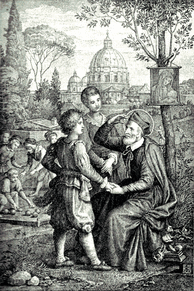 St Philip Neri whose feast we celebrate today is known as the Apostle of Joy and as the third Apostle of Rome. Throughout his ministry in Rome, he stressed the importance of joy in the life of a disciple of Christ. His own joy and humility attracted people from every walk of life to him and ultimately Christ. St. Philip was born in Florence in 1515. Born to an affluent family, he forfeited a promising career in business with his uncle in order to move to Rome in 1535. While in Rome as a layman, Philip would immerse himself in prayer during the night at the catacombs and during the day would care for the sick in the overcrowded hospitals and the pilgrims. Philip developed a following in Rome who wanted to imitate his example and was reluctantly ordained to the priesthood in 1551. Philip and this group that he attracted would “meet informally for prayer, discussion, and recreation together, before going off to minister to the needy.” They became known as the Oratorians and helped to re-evangelize Rome. While we celebrate St. Philip Neri’s feast today it is helpful to examine a few reasons as to why his charism is as relevant today as it was in the 16th century. Firstly, St. Philip’s ministry was characterized by its relational approach. He evangelized one on one. During the Carnivale in Rome which brought much disgraceful behavior with it, St. Philip went out in the city and organized events to counteract the Carnivale. He was willing to go out and meet people were they were at. He first built relationships with people and then invited them into a deeper relationship with Christ. He was able to achieve this and build so many relationships because his ministry was characterized by joy and humility. For St. Philip, joy and humility were both integral parts of the Christian life and inseparable from one another. He repeatedly said, “Cheerfulness strengthens the heart and makes us persevere in a good life. Therefore the servant of God ought always to be in good spirits.” People were attracted by his joy and authenticity and wanted to experience it for themselves. Also, St. Philip who was only ordained later on life, emphasis the role of the laity in the Church. He believed holiness was attainable for the laity and was a proponent of frequent communion and confession, himself spending hours a day in the confessional. The laity were not treated as a third order, but as a first order. The Oratory existed to serve the needs of the laity who were living in Rome. St. Philip Neri’s example should inspire us to always joyfully seek a deeper relationship with the Lord. He reminds us that we are called to holiness and he is a model for the New Evangelization. St. Philip understood we will not attract people to Catholicism if we do not exhibit the joy that is a result of our relationship with Christ. Conor Boland is a College Ministerial Intern for One Bread One Cup, at Saint Meinrad Seminary & School of Theology and is an undergraduate at The Catholic University of America.
A couple of weeks ago, I traveled to my hometown in Wisconsin to surprise my mother on her birthday. My father had been cooking up a giant surprise party for her, and I was going to be the first part of that surprise. I spent this whirlwind weekend almost exclusively with my family…both immediate and extended. My mother’s side of the family is what is often described as the “stereotypical Irish Catholic family.” My grandparents met in college, married and had 9 children. I have over 40 first cousins and many of us live within a mile of my grandparents’ house. Growing up in this family was a unique experience and one which I realize now has shaped me more than I can know.
Moving halfway across the country, away from my family, has given me a new appreciation for the role that family plays in forming who we become as adults. I was raised by loving parents who instilled a strong faith background in my siblings and me. Mass was a given every weekend. We were fortunate enough to attend wonderful Catholic schools. Our parents modeled for us the perfect example of a loving, Christian marriage. My extended family too, further encouraged the development of a strong faith formation. From a young age, I can remember Saturday evening Masses in my grandparents’ living room which often preceded our monthly birthday celebrations. (It got too hard to celebrate individual birthdays!). Our grandparents created an environment filled with love, somehow making each of their many grandchildren feel like the center of their world. When I was young and had a day off from school, the biggest excitement was not getting to sleep in, but rather getting to go to daily Mass with my grandparents. The first time I went to Mass with them after my first communion, my grandmother couldn’t stop telling everyone in the tiny church that I had received my First Eucharist. Family plays a key role in how we develop as people. I recognize now just how fortunate I was to grow up in the environment that I did. I also recognize that many people are not this lucky. As the summer winds down, I know many people will be heading back to school or back from vacations with their families. I challenge you to take time to remember your family. Say a prayer for those you’ve lost, call your mom, call your grandparents, text your sister or brother, or any other way you can think of. During my senior year of college, my dad started writing me a letter every week (and continues to do so!). In today’s world of online everything, getting those letters each week was a physical connection to home and to the family I have there. Our families can be complicated and tricky, and often are the people who can infuriate us the most. They are, though, the people we love the most. Let me share with you this prayer for a harmonious family: Lord Jesus, be with my family. Grant us Your peace and harmony, an end to conflict and division. Gift us with compassion to better understand each other, wisdom and love to assist each other, and trust and patience to live peacefully together. Grant that through the intercession of Your Mother, Mary, and St. Joseph, our family may become a holy family accepting each other, working together in unity, selflessly dedicated to one other and to You. Amen. Rebecca Ruesch is the Blog Editor for the Catholic Apostolate Center. “Wow, you got your hands full.”
If you’re a parent, it’s possible that you have heard this statement thrown in your direction before. My wife and I, as we approach our seventh wedding anniversary, have three children. I find it amazing when people say “you got your hands full” when I am only holding one of my children. Imagine if they saw me when all three were climbing on me at the same time, or when they’re hungry and in a seemingly rehearsed chorus they ask for different foods in harmony. With the Third Extraordinary Synod of Bishops set to meet this Fall, Pope Francis and bishops from around the world will be discussing issues related to marriage and family life. I believe that the Catholic Church’s vision for married life offers a fresh and engaging perspective for our contemporary world. St. John Paul II declares, “The communion of love between God and people, a fundamental part of the Revelation and faith experience of Israel, finds a meaningful expression in the marriage covenant which is established between a man and a woman” (Familiaris Consortio 12). The approaching synod has caused me to reflect on how I live my vocation to married life. In his book Divine Likeness, Cardinal Marc Ouellet suggests that since Vatican II and St. John Paul II, “the theology of marriage has been developed in terms of ‘gift’…” (Ouellet 150-151). Men and women are created in the image of God (cf. Genesis 1:26-27). One of the great theological insights of Vatican II was the idea that “man, who is the only creature on earth which God willed for itself, cannot fully find himself except through a sincere gift of himself” (Gaudium et Spes 24). Only through a gift of self can people find their true purpose and meaning in life. This is because a total self gift both participates in and manifests the divine life to which we’re invited. Many of us are familiar with St. John Paul II’s Wednesday audiences which have become what we call the “Theology of the Body.” The giving of oneself in marriage, including in the conjugal act, is discussed in terms of a total gift of oneself. In a marriage covenant, husband and wife can manifest Trinitarian love, and the communion to which all people are drawn. For a husband or wife to hold back anything would be a betrayal of the communion which they’re guided by the Holy Spirit to manifest. Cardinal Angelo Scola in The Nuptial Mystery draws from St. John Paul II’s “Theology of the Body” and describes how the perichoresis of the Triune God is based on total self-giving. This is described beautifully in the following: Communio personarum exists in its perfection in the Three in One, because the Father gives himself completely to the Son without keeping anything of his divine essence for himself… The Son himself gives back the same, perennial divine essence. This exchange of love between the two is so perfect as to be fruitful in a pure state: it gives rise to another person, the Holy Spirit (donum doni) (Scola, 131). The Father completely gives everything He is to the Son; the Son completely gives Himself back in totality to the Father. Their self-giving love is so total and so perfect that it is fruitful and a third Person arises, the Holy Spirit. Cardinal Scola makes the connection between this Trinitarian relationship and the relationship between husband and wife. A husband and wife can give a total gift of self, offering all that they are, and in the context of the conjugal act, it is possible that a new person can be created. But Cardinal Ouellet also mentions that whether or not a new child is conceived, the love of the spouses is fruitful in that they are manifesting the Trinitarian gift of self (cf. Ouellet 172). There is an element of sacrifice involved here. The spouses freely commit to each other, accepting the new life if God should bless them with a child. However, if a couple experiences difficulty in conceiving, they also accept the sacrifice associated with not being able to bear children. In both cases, the spouses who completely give of themselves in love have the opportunity to offer themselves as a spiritual sacrifice to the Lord (cf. Romans 12:1) and to participate in the economy of salvation by manifesting Trinitarian love through a gift of self. So my response to my interlocutors should be “Yes, I have my hands full: they’re full with my gift of self to the Lord. I give Him all that I am in loving surrender in an act of self-emptying gift-giving aimed at being drawn deeper into the mystery of the Trinitarian communio personarum, and this participation in the divine life penetrates who I am, giving me the grace and love to offer myself as a self gift to my wife.” Do you think that would get their attention? Either way, what is essential to remember is that God invites us to participate in His very own divine life and we can experience true love through sincere acts of self gift. Edward Trendowski is Coordinator for Catechetical Resources for the Diocese of Providence and teaches pastoral theology for Saint Joseph’s College Online. This blog post was first published on the St. Joseph’s College of Maine Theology Faculty Blog. Click here to learn more about our cooperative alliance with St. Joseph’s College Online We celebrate Pentecost on June 8th, 50 days after Easter, to commemorate the Holy Spirit’s descent on Christ’s disciples after His Ascension. We are, in many ways, celebrating the birthday [E1] of the Church and our individual commitments to God.
The Holy Spirit empowers us to share our faith, to have the ability to open our hearts in understanding one another and God’s message. Through the gifts of the Holy Spirit (wisdom, understanding, counsel, knowledge, fortitude, piety and fear of the Lord), we become fully alive in our personal relationship with God so we can give better witness to His message. The Catechism of the Catholic Church says, “…the Church is sent to announce, bear witness, make present, and spread the mystery of the communion of the Holy Trinity” (CCC 738). We can use Pentecost as an opportunity to make our faith our own while sharing God’s word. By utilizing our individual talents and volunteering in some aspect of our church, we strengthen our faith and build community. I remember wanting to be an altar server after receiving my first Holy Communion in second grade. I began altar serving and continued to do so until I received Confirmation. Serving during the Mass allowed me, as a young girl, to better understand my Catholic faith. My parents remember me saying how I enjoyed altar serving because I had to pay attention (and stay awake) during 8 a.m. Sunday Mass. Assisting the priest on the altar, I began to fully understand and celebrate the Liturgy of the Word and Liturgy of the Eucharist every Sunday. I attended Catholic school and was able to make connections between Religion class and weekly Mass by serving during church service. Once confirmed, I continued to volunteer in my church as a lector as well as taught religion education to grade school children. Actively participating in my church allowed me to fully engage in my Catholic faith and grow spiritually. No matter our age, the Catholic Church encourages us to be active participants in Mass and in our Church. Through the work of the Holy Spirit, we can come to discover where the Church needs us and how we can best share the time, talent, and treasure God has given us. My parish hosts a ministry fair each year, which gives parishioners an opportunity to see other ministries within the Church and where we can best serve God and our community. Pentecost allows us to renew ourselves to the Holy Spirit. Pope Francis asks us in his daily Mass homily on May 19th this year to question ourselves: “What kind of heart do we have? … Is my heart fixed upon everyday gods or is it a heart fixed on the Holy Spirit?” It is easy for us to get wrapped up in life’s habitual tasks at home, work, with family, colleagues, etc. Pope Francis encourages us that the Holy Spirit “gives us strength, gives us the steadiness to be able to move forward in life in the midst of many events.” Dana Edwards is a recent graduate of the University of Florida. She currently resides in Tallahassee, Florida where she volunteers as a lector and with communication outreach at her local parish, Good Shepherd Catholic Church. I carry wounds. I carry scars. I carry pains. I carry all of these pieces of sadness, loneliness, challenge, and despair inside me. Some wounds are visible and others are buried deep inside my heart. I have been a part of causing wounds and others have inflicted me with wounds. I have healed from and I have ignored my wounds. I carry wounds but I also am learning how to ask for help in binding them.
I recently attended a retreat that focused on grace and the “wounded healer.” Throughout the time I had the opportunity to reflect on where I am on this life journey and what has happened, is happening, or will happen in the future. Immediately, I thought of Henri Nouwen’s book Wounded Healer and how the paradox of someone who is broken reveals the mystery of discovering how to heal. The retreat led me to a deeper understanding of the interior life, God lives in me and has been broken, but he also wishes to heal and be healed. Nouwen writes, “The man who articulates the movements of his inner life, who can give names to his varied experiences, need no longer be a victim of himself, but is able slowly and consistently to remove the obstacles that prevent the spirit from entering. He is able to create space for Him who heart is greater than his, whose eyes see more than his, and whose hands can heal more than his.” He shows how naming the wounds we experience leads to the natural desire to open up to the grace of the Holy Spirit. Jesus invites us in to create that space. We see how he was an example of healing and woundedness in his ministry, being vulnerable and patient, sacrificing his life in love. We see it in his state of being God and Man, his inviting the twelve, his working miracles for the visibly and the spiritually sick, and even in his silence when he knew what was to come on the cross. Working in ministry I find that aiding in the healing of others comes more easily than letting myself be healed. This theme showed me how difficult it is to expose weaknesses and be vulnerable. Sometimes the simple acknowledgement of a sin or experience is overbearing. In the retreat setting I opened myself up to engage with my wounds and seek guidance in understanding what I will need to heal. I also had to recognize that the healing might not be a quick process. Words from Helen Keller, who dealt with a physical wound of blindness, showed me the wound’s potential to foster strength and growth. She writes, “Face your deficiencies and acknowledge them; but do not let them master you. Let them teach you patience, sweetness, insight.” We all carry wounds. In some form we react to them, hide them, or learn to mend them. One of the prayer services that concluded the retreat involved reflection on the sacrament of Anointing of the Sick. The leader spoke about how we do not hear about this sacrament in the way we do the number of joyful sacraments of First Communion, Confirmation, or Matrimony. In many ways it shows how even those who believe in the power of healing find it difficult to expose their wounds. Showing our wounds reveals a part of us that we are not proud of or afraid of knowing. How different would our world be if it seemed more acceptable to open up and to anoint each other in our physical and spiritual sicknesses! In so many ways it is a privilege to be a part of that sacramental healing, to listen and allow someone to share with you what he or she is going through, or to share something yourself. When we engage with the grace that works in our lives and look at our wounds we see how the two converge. Grace is there to help comfort and guide us in the Holy Spirit. Acknowledging the work of grace and receiving its gifts help us to recognize how our wounds have the ability to make us stronger. Pope Francis spoke about embracing the wounds of Christ in others and how it transforms both them and us. “We need to touch Jesus' wounds, caress Jesus' wounds, bind them with tenderness; we must kiss Jesus' wounds, literally. Just think: what happened to St. Francis, when he embraced the leper? The same thing that happened to Thomas (the apostle): his life changed”. Our lives change when we encounter and embrace Jesus, others, and ourselves in our state of being wounded. Like the sacrament of healing, the visible act of carrying our woundedness and asking for healing leads us to love and receive better. Sophie Jacobucci serves as a second-year Echo Apprentice in the Diocese of Manchester, NH. "Commitment to ecumenism responds to the prayer of the Lord Jesus that 'they may all be one' (Jn 17:21). The credibility of the Christian message would be much greater if Christians could overcome their divisions and the Church could realize 'the fullness of catholicity proper to her in those of her children who, though joined to her by baptism, are yet separated from full communion with her' We must never forget that we are pilgrims journeying alongside one another. This means that we must have sincere trust in our fellow pilgrims, putting aside all suspicion or mistrust, and turn our gaze to what we are all seeking: the radiant peace of God’s face” (Evangelii Gaudium, n. 244).
Over the nine years that I was at St. Jude Shrine in Baltimore, Maryland, I had the opportunity to participate in and then to host an annual prayer service for Christian Unity. It became a very popular celebration and leaders from various Christian communities participated, including the Archbishop of Baltimore. To me, though, the most important people who participated were the people who went week to week to their faith communities in various parts of Baltimore, but never had the opportunity to pray together with Christians from other communities. Prayer is powerful and to underestimate its power to unite us leaves us lacking in the virtue of hope. Such hope is not naïve, but is based on firm trust in the work of the Holy Spirit. The annual Week of Prayer for Christian Unity will begin on Saturday, January 18th and conclude on the Feast of the Conversion of St. Paul on January 25th. Year after year, Christians are invited to pray that “they may be one.” St. Vincent Pallotti, patron of the Catholic Apostolate Center and founder of the Union of Catholic Apostolate, worked diligently for unity in the Church, using the liturgical Octave of the Epiphany in Rome as a means to unite in prayer members of the Eastern and Western traditions of the Catholic community who were rather disconnected from one another. This celebration was held in the city of Rome from 1836 until 1968. His feast day, on January 22nd, is in the middle of the Week of Prayer for Christian Unity. Collaboration of all Christians can lead us toward Pallotti’s vision, hope, and prayer that one day we may be “one fold, under one Shepherd, Jesus Christ” (Cf., Jn 10:16) Since our mission as the Catholic Apostolate Center is derived from the charism of St. Vincent Pallotti, who fervently prayed for such a day, we invite you to pray not only individually, but draw other Christians together in prayer. Prayer, though, is not the only thing that we can do. We can learn more about what the Roman Catholic Church teaches about the needed work for building unity among Christians. We invite you to explore the many resources that we have on our new Christian Unity page. May we also take up the call of the Catholic Church spanning from the time of the Second Vatican Council to the appeal of Pope Francis today: "The search for unity among Christians is an urgent task... We are well aware that unity is primarily a gift from God for which we must pray without ceasing, but we all have the task of preparing the conditions, cultivating the ground of our hearts, so that this great grace may be received" (Address to the Delegation of the Ecumenical Patriarchate of Constantinople, June 28, 2013). Our new Christian Unity resources can be found here. Fr. Frank Donio, S.A.C. is the Director of the Catholic Apostolate Center As we celebrate Independence Day, a day of thanksgiving and gratitude for this great country we live in, let us be reminded of our first American Saint, Elizabeth Ann Seton and the work she did to bring liberty and justice to all! The following is the Homily of the Pope Paul VI on the Canonization of Elizabeth Ann Seton, with emphasis added. 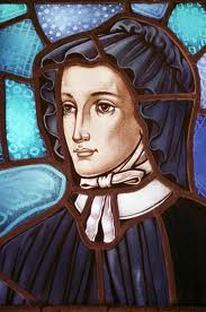 Yes, Venerable Brothers and beloved sons and daughters! Elizabeth Ann Seton is a Saint! We rejoice and we are deeply moved that our apostolic ministry authorizes us to make this solemn declaration before all of you here present, before the holy Catholic Church, before our other Christian brethren in the world, before the entire American people, and before all humanity. Elizabeth Ann Bayley Seton is a Saint! She is the first daughter of the United States of America to be glorified with this incomparable attribute! But what do we mean when we say: "She is a Saint"? We all have some idea of the meaning of this highest title; but it is still difficult for us to make an exact analysis of it. Being a Saint means being perfect, with a perfection that attains the highest level that a human being can reach. A Saint is a human creature fully conformed to the will of God. A Saint is a person in whom all sin-the principle of death-is cancelled out and replaced by the living splendor of divine grace. The analysis of the concept of sanctity brings us to recognize in a soul the mingling of two elements that are entirely different but which come together to produce a single effect: sanctity. One of these elements is the human and moral element, raised to the degree of heroism: heroic virtues are always required by the Church for the recognition of a person's sanctity. The second element is the mystical element, which express the measure and form of divine action in the person chosen by God to realize in herself-always in an original way-the image of Christ (Cfr.Rom. 8, 29). The science of sanctity is therefore the most interesting, the most varied, the most surprising and the most fascinating of all the studies of that ever mysterious being which is man. The Church has made this study of the life, that is, the interior and exterior history, of Elizabeth Ann Seton. And the Church has exulted with admiration and joy, and has today heard her own charism of truth poured out in the exclamation that we send up to God and announce to the world: She is a Saint! We shall not now give a panegyric, that is, the narrative which glorifies the new Saint. You already know her life and you will certainly study it further. This will be one of the most valuable fruits of the Canonization of the new Saint: to know her, in order to admire in her an outstanding human figure; in order to praise God who is wonderful in his saints; to imitate her example which this ceremony places in a light that will give perennial edification; to invoke her protection, now that we have the certitude of her participation in the exchange of heavenly life in the Mystical Body of Christ, which we call the Communion of Saints and in which we also share, although still belonging to life on earth. We shall not therefore speak of the life of our Saint Elizabeth Ann Seton. This is neither the time nor the place for a fitting commemoration of her. But at least let us mention the chapters in which such a commemoration should be woven. Saint Elizabeth Ann Seton is an American. All of us say this with spiritual joy, and with the intention of honoring the land and the nation from which she marvelously sprang forth as the first flower in the calendar of the saints. This is the title which, in his original foreword to the excellent work of Father Dirvin, the late Cardinal Spellman, Archbishop of New York, attributed to her as primary and characteristic: "Elizabeth Ann Seton was wholly American!" Rejoice, we say to the great nation of the United States of America. Rejoice for your glorious daughter. Be proud of her. And know how to preserve her fruitful heritage. This most beautiful figure of a holy woman presents to the world and to history the affirmation of new and authentic riches that are yours: that religious spirituality which your temporal prosperity seemed to obscure and almost make impossible. Your land too, America, is indeed worthy of receiving into its fertile ground the seed of evangelical holiness. And here is a splendid proof-among many others-of this fact. May you always be able to cultivate the genuine fruitfulness of evangelical holiness, and ever experience how-far from stunting the flourishing development of your economic, cultural and civic vitality -it will be in its own way the unfailing safeguard of that vitality. Saint Elizabeth Ann Seton was born, brought up and educated in New York in the Episcopalian Communion. To this Church goes the merit of having awakened and fostered the religious sense and Christian sentiment which in the young Elizabeth were naturally predisposed to the most spontaneous and lively manifestations. We willingly recognize this merit, and, knowing well how much it cost Elizabeth to pass over to the Catholic Church, we admire her courage for adhering to the religious truth and divine reality which were manifested to her therein. And we are likewise pleased to see that from this same adherence to the Catholic Church she experienced great peace and security, and found it natural to preserve all the good things which her membership in the fervent Episcopalian community had taught her, in so many beautiful expressions, especially of religious piety, and that she was always faithful in her esteem and affection for those from whom her Catholic profession had sadly separated her. For us it is a motive of hope and a presage of ever better ecumenical relations to note the presence at this ceremony of distinguished Episcopalian dignitaries, to whom-interpreting as it were the heartfelt sentiments of the new Saint-we extend our greeting of devotion and good wishes. And then we must note that Elizabeth Seton was the mother of a family and at the same time the foundress of the first Religious Congregation of women in the United States. Although this social and ecclesial condition of hers is not unique or new (we may recall, for example, Saint Birgitta, Saint Frances of Rome, Saint Jane Frances Fremiot de Chantal, Saint Louise de Marillac), in a particular way it distinguishes Saint Elizabeth Ann Bayley Seton for her complete femininity, so that as we proclaim the supreme exaltation of a woman by the Catholic Church, we are pleased to note that this event coincides with an initiative of the United Nations: International Women's Year. This program aims at promoting an awareness of the obligation incumbent on all to recognize the true role of women in the world and to contribute to their authentic advancement in society. And we rejoice at the bond that is established between this program and today's Canonization, as the Church renders the greatest honor possible to Elizabeth Ann Bayley Seton and extols her personal and extraordinary contribution as a woman -a wife, a mother, a widow, and a religious. May the dynamism and authenticity of her life be an example in our day-and for generations to come-of what women can and must accomplish, in the fulfillment of their role, for the good of humanity. And finally we must recall that the most notable characteristic of our Saint is the fact that she was, as we said, the foundress of the first Religious Congregation of women in the United States. It was an offspring of the religious family of Saint Vincent de Paul, which later divided into various autonomous branches-five principal ones-now spread throughout the world. And yet all of them recognize their origin in the first group, that of the Sisters of Charity of Saint Joseph's, personally established by Saint Elizabeth Seton at Emmitsburg in the Archdiocese of Baltimore. The apostolate of helping the poor and the running of parochial schools in America had this humble, poor, courageous and glorious beginning. This account, which constitutes the central nucleus of the earthly history and worldwide fame of the work of Mother Seton, would merit a more extended treatment. But we know that her spiritual daughters will take care to portray the work itself as it deserves. Holy Saturday is one of my favorite days of the Liturgical Year. Since donning my first monastic-style altar server alb shortly after my First Communion, the celebration of the Sacred Paschal Triduum is not only the apex of the liturgical year, but mine as well. I always look forward to the day when Christ is in the tomb and we joyfully await the great Easter Vigil after sundown, with its elements that illuminate all of our senses.
Before we can glory in the Resurrection of the Redeemer, we must first wait in prayerful expectation while Christ is asleep in the tomb. The most poignant illustration of this anticipated celebration is from an “ancient homily on Holy Saturday,” written by an author forgotten by the centuries, and featured prominently in the Office of Readings of the Liturgy of the Hours on Holy Saturday: "Something strange is happening—there is a great silence on earth today, a great silence and stillness. The whole earth keeps silence because the King is asleep. The earth trembled and is still because God has fallen asleep in the flesh and he has raised up all who have slept ever since the world began. God has died in the flesh and hell trembles with fear. "He has gone to search for our first parent, as for a lost sheep. Greatly desiring to visit those who live in darkness and in the shadow of death, he has gone to free from sorrow the captives Adam and Eve, he who is both God and the son of Eve. The Lord approached them bearing the cross, the weapon that had won him the victory. At the sight of him Adam, the first man he had created, struck his breast in terror and cried out to everyone: “My Lord be with you all.” Christ answered him: "And with your spirit." He took him by the hand and raised him up, saying: "Awake, O sleeper, and rise from the dead, and Christ will give you light."" We wait in joyful anticipation for the chanting of “Lumen Christi--The Light of Christ” that pierces the darkness and the solemn intoning of the Exsultet, the great Easter Proclamation during the Easter Vigil. In the Exsultet, we join in praying in the midst of the newly lit paschal candle, “This is the night of which it is written: The night shall be as bright as day, dazzling is the night for me, and full of gladness. … May this flame be found still burning by the Morning Star: the one Morning Star who never sets, Christ your Son…” Together, we pray that Christ, the Beginning and the End, the Alpha and the Omega, may illumine our way through the darkness until we rejoice tonight in the splendor of the Vigil of Vigils, the holiest night of the Church year. Until then we wait, for something strange is happening. Alex R. Boucher is the Program & Operations Coordinator for the Catholic Apostolate Center. Follow Alex on Twitter at @AlexBoucher. |
Details
Archives
July 2024
Categories
All
|
About |
Media |
© COPYRIGHT 2024 | ALL RIGHTS RESERVED





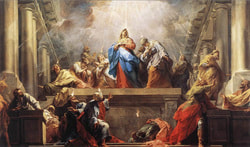
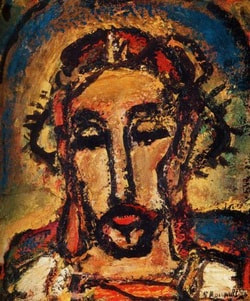

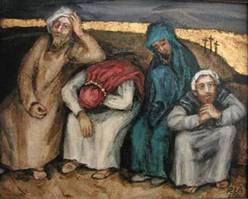
 RSS Feed
RSS Feed